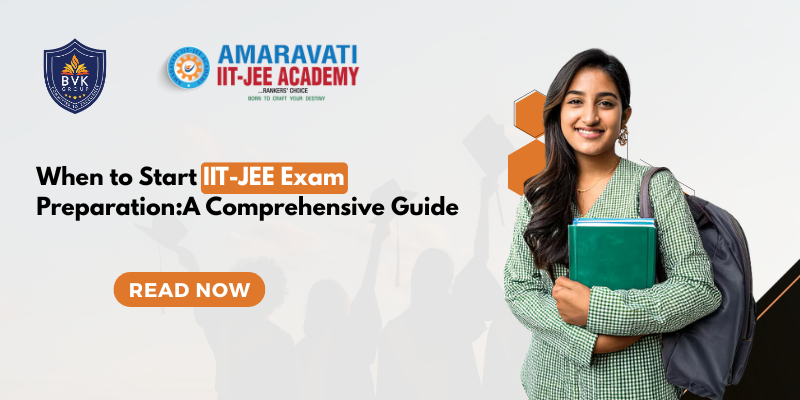
When to Start IIT-JEE Exam Preparation: A Comprehensive Guide
The IIT-JEE Aspiring engineers need a well-planned and disciplined approach to crack the exam. One of the most frequently asked questions by students and parents is: When should I start preparing for IIT-JEE? In this article, we will discuss why starting early is beneficial, the ideal time to begin preparation, and how to balance it with school studies. We will also explore time management strategies, tips for late starters, and common mistakes to avoid while preparing for the exam.
Why Starting Early is Beneficial for IIT-JEE
Starting early for IIT-JEE preparation is highly beneficial because it gives you more time to build a strong foundation in key subjects like Physics, Chemistry, and Mathematics. With extra time, you can master difficult topics, practice problem-solving, and take mock tests without feeling rushed. This helps reduce stress and pressure as the exam approaches. Early preparation also allows for better time management, regular revisions, and the chance to focus on weak areas. Overall, starting early helps you stay calm, confident, and well-prepared to tackle the exam successfully.
Here’s a table that compares the different stages of IIT-JEE preparation across Class 9, Class 11, and Class 12. After the table, I’ll provide a detailed explanation for each aspect.
IIT-JEE Preparation: Comparison Table
| Aspect | Class 9 | Class 11 | Class 12 |
| Ideal Time to Start | Early start to build a foundation | Best time for serious preparation | Balancing both JEE and Board exams |
| Focus | Conceptual understanding and basics | Deep dive into JEE syllabus, core subjects | JEE Main preparation, revising for Board exams |
| Syllabus | Core concepts that form the base for JEE | Full JEE syllabus begins, advanced topics | Final JEE topics and revision for Board exams |
| Preparation Approach | Gradual, step-by-step learning | Structured and focused study plan | Time management between JEE and Board exams |
| Advantages | Strong foundation and less pressure | Ample time to master concepts and practice | Revision-focused, simultaneous preparation |
| Challenges | Limited exposure to JEE concepts | Increased workload and pressure | Time constraints, balancing both exams |
| Time for Revision | Limited, focus on basics | Sufficient time for revision | Limited time, focus on key topics |
| Intensity of Study | Low intensity, gradual learning | Moderate to high intensity, focused on JEE | High intensity, intensive revision and practice |
| Coaching/Materials | basic understanding | structured learning | Coaching or online |
| Result Impact | Lays the groundwork for Class 11 | Direct impact on JEE Main preparation | Significant impact on both JEE Main and Board exams |
How Late Starters Can Still Crack IIT-JEE
While starting early is ideal for IIT-JEE preparation, late starters can still succeed with the right approach. Here’s how they can manage:
- Focused Study Plan: Late starters need a structured study plan that prioritizes important topics and follows a time-bound approach.
- Intensive Revision: Focus on concepts and formulas. Devote more time to revision to consolidate learning and avoid last-minute cramming.
- Regular Mock Tests: Taking regular mock tests helps you assess progress, identify weaknesses, and fine-tune your approach to problem-solving.
- Expert Guidance: Opt for coaching or online tutorials to streamline learning and receive expert advice on tricky topics.
- Prioritize JEE Main Topics: Focus on core subjects of JEE Main and ensure thorough practice in key areas such as Mechanics, Organic Chemistry, and Calculus.
Effective Time Management Strategies
- Create a Realistic Schedule: Divide study time into focused blocks for each subject and stick to a consistent timetable.
- Set Clear Goals: Break your preparation into daily, weekly, and monthly goals. This ensures steady progress and avoids last-minute rushes.
- Prioritize Difficult Topics: Focus more on challenging topics first, leaving easier ones for later. It ensures you tackle tough areas when your energy levels are high.
- Use the Pomodoro Technique: Study in short bursts (e.g., 25 minutes) followed by short breaks to maintain focus and prevent burnout.
- Avoid Multitasking: Focus on one task at a time to increase efficiency and avoid confusion during study sessions.
Common Mistakes to Avoid While Starting IIT-JEE Preparation Late
- Skipping the Basics: Jumping directly into advanced topics without understanding the fundamentals can lead to confusion. Master the basics first.
- Ignoring Time Management: Without a structured plan, it’s easy to get overwhelmed. Always manage your time wisely and follow a timetable.
- Overloading with Resources: Trying to cover too many books or study materials can lead to information overload. Stick to a limited number of quality resources.
- Neglecting Mock Tests: Avoiding mock tests and sample papers limits your understanding of the exam pattern. Regular practice with mock exams is essential.
- Ignoring Mental Health: Stress can negatively impact performance. Ensure to take breaks, stay active, and practice relaxation techniques.
Conclusion
While starting IIT-JEE preparation late can seem daunting, with the right strategies, it’s still possible to succeed. Focus on creating a structured study plan, prioritize key topics, and take regular mock tests to assess your progress. Avoid common mistakes like neglecting basics and overloading resources. With effective time management and perseverance, late starters can still crack the IIT-JEE exam and achieve their goals.